EP 842 America Is in Decline but Competitors are Declining, Too–and Faster
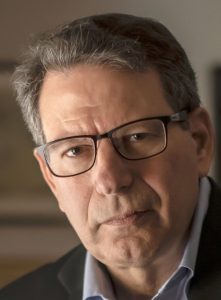 Robert Kaplan’s erudite take on the world’s geopolitical situation can be summed up in the manner described in our headline, but there is so much more nuance in his book “Waste Land: A World in Permanent Crisis” that you must read it for yourself to grasp the complexities of our fast-changing world in these illegible times. Trust me, a careful reading describes a new era of global cataclysm with a deadly cocktail of war, climate change, great power rivalry, rapid technological advancement, the end of monarchy and empire, and countless other dangers. Our guest makes the keen observation that the current geopolitical landscape must be considered alongside contemporary social phenomena such as urbanization and digital media. His framework encompasses philosophy, politics and literature as he helps us find our footing in this tremulous period. His masterful comparisons to the Weimar Republic are alone worth the price of the book. Or listen to the podcast, which is free to all.
Robert Kaplan’s erudite take on the world’s geopolitical situation can be summed up in the manner described in our headline, but there is so much more nuance in his book “Waste Land: A World in Permanent Crisis” that you must read it for yourself to grasp the complexities of our fast-changing world in these illegible times. Trust me, a careful reading describes a new era of global cataclysm with a deadly cocktail of war, climate change, great power rivalry, rapid technological advancement, the end of monarchy and empire, and countless other dangers. Our guest makes the keen observation that the current geopolitical landscape must be considered alongside contemporary social phenomena such as urbanization and digital media. His framework encompasses philosophy, politics and literature as he helps us find our footing in this tremulous period. His masterful comparisons to the Weimar Republic are alone worth the price of the book. Or listen to the podcast, which is free to all.
Podcast: Play in new window | Download
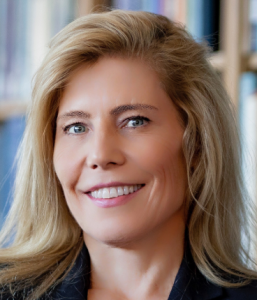 Donald Trump said he would end Russia’s war of aggression against Ukraine on day one of his second Administration. While that date has come and gone, he is making moves to find a resolution to the conflict, but is it a continuation of the U.S.-led NATO effort on the side of Ukraine or has America switched teams? Given Trump’s fascination with strongmen, like Putin, and major powers paying little deference to smaller actors, fears are growing that all of Ukraine’s brave sacrifices may result in the loss of territory and few security assurances. President Trump’s words suggest a major departure from Biden era policies. It raises the specter of the 70- year NATO alliance, one which many consider the greatest defense structure in modern history, in rubble in its wake. Greta Uehling, a professor at the University of Michigan, and author of “Decolonizing Ukraine: The Indigenous People of Crimea and Pathways to Freedom” joins us to discuss the possibilities going forward.
Donald Trump said he would end Russia’s war of aggression against Ukraine on day one of his second Administration. While that date has come and gone, he is making moves to find a resolution to the conflict, but is it a continuation of the U.S.-led NATO effort on the side of Ukraine or has America switched teams? Given Trump’s fascination with strongmen, like Putin, and major powers paying little deference to smaller actors, fears are growing that all of Ukraine’s brave sacrifices may result in the loss of territory and few security assurances. President Trump’s words suggest a major departure from Biden era policies. It raises the specter of the 70- year NATO alliance, one which many consider the greatest defense structure in modern history, in rubble in its wake. Greta Uehling, a professor at the University of Michigan, and author of “Decolonizing Ukraine: The Indigenous People of Crimea and Pathways to Freedom” joins us to discuss the possibilities going forward.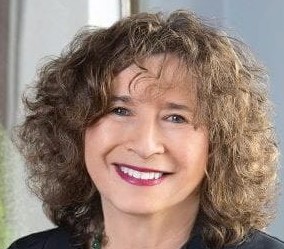 When Professor Nancy Rosenblum joined us months back, she and Russell Muirhead had written a book called “Ungoverning” The Attack on the Administrative State and the Politics of Chaos.” Their case study was the first Trump Administration. And while every modern state is an administrative state, the bureaucracy at all levels of government has been under attack for decades claiming that it is rife with waste, fraud and abuse. If so, then why fire, as one of Trump 2’s first acts, the Inspectors General for a number of agencies?. They are the internal auditors who have found billions of dollars in inefficiencies over the years. Perhaps it is because the goal is not institutional reform, but deconstruction. Then, you might say, why? When you replace career civil servants with political cronies you get more control vested in the Office of the President and the Imperial Presidency on steroids. Our guest, Professor Rosenblum, a Professor of Ethics in Politics and Government Emerita at Harvard University, breaks down what she sees as three actors playing out their long- held desires–President Trump, Elon Musk and the Project 2025 crowd. Are they on a course to deconstruct the federal government or a crash course in hubris and overreach? Find out today on the podcast.
When Professor Nancy Rosenblum joined us months back, she and Russell Muirhead had written a book called “Ungoverning” The Attack on the Administrative State and the Politics of Chaos.” Their case study was the first Trump Administration. And while every modern state is an administrative state, the bureaucracy at all levels of government has been under attack for decades claiming that it is rife with waste, fraud and abuse. If so, then why fire, as one of Trump 2’s first acts, the Inspectors General for a number of agencies?. They are the internal auditors who have found billions of dollars in inefficiencies over the years. Perhaps it is because the goal is not institutional reform, but deconstruction. Then, you might say, why? When you replace career civil servants with political cronies you get more control vested in the Office of the President and the Imperial Presidency on steroids. Our guest, Professor Rosenblum, a Professor of Ethics in Politics and Government Emerita at Harvard University, breaks down what she sees as three actors playing out their long- held desires–President Trump, Elon Musk and the Project 2025 crowd. Are they on a course to deconstruct the federal government or a crash course in hubris and overreach? Find out today on the podcast.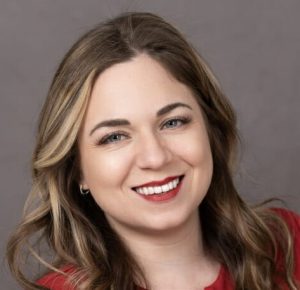 While the recent killing of the United Health Care CEO was a shocking and heinous act, it brought to the surface long held frustrations with our health care system in terms of access and costs. For some time, it has been hard to have a conversation with anyone who feels that our delivery system is working, be it because of insurance snaggles, access to providers, or the transparency surrounding costs of procedures. As the health care system has become even more financialized with the purchase of hundreds of hospitals by large hospital groups and private equity firms, which see dollar signs over patient care, the situation grows more dire. Add to this our growing dependence on medications and Big Pharma is part of a growing list of groups frustrating patients today. Joining us for a panoramic discussion of health care in America is Lindsay Dymowski, President of Centennial Pharmacy Services, a leading medication-at-home pharmacy.
While the recent killing of the United Health Care CEO was a shocking and heinous act, it brought to the surface long held frustrations with our health care system in terms of access and costs. For some time, it has been hard to have a conversation with anyone who feels that our delivery system is working, be it because of insurance snaggles, access to providers, or the transparency surrounding costs of procedures. As the health care system has become even more financialized with the purchase of hundreds of hospitals by large hospital groups and private equity firms, which see dollar signs over patient care, the situation grows more dire. Add to this our growing dependence on medications and Big Pharma is part of a growing list of groups frustrating patients today. Joining us for a panoramic discussion of health care in America is Lindsay Dymowski, President of Centennial Pharmacy Services, a leading medication-at-home pharmacy.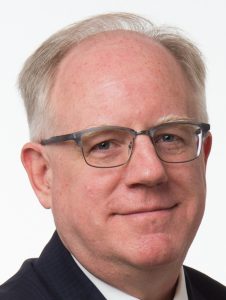 For years, we have seen the richer get richer in America and the poor stagnate or lose economic ground. Even the 2024 election was won by Donald Trump because many who voted for him felt that the middle- class life they wanted was becoming out of reach, even though the macro-economic indices were saying things were going well. Now, along comes a recently revised 2023 study by MIT researchers showing that over the past four years wage inequality has shrunk dramatically. What? Since the 1980’s wage inequality has been mostly a one-way street, with the benefits of wage growth going to those with more education and skills while those with fewer of these characteristics seeing lower wage growth. That fact makes it surprising to see, in the MIT study, that real wage increases among workers without college degrees have reversed nearly one-third of the cumulative wage inequality from 1980 to 2019. This is a remarkable turnaround. On today’s podcast we explore the reasons behind it with Brent Orrell, a Senior Fellow for Domestic Policy with the American Enterprise Institute(aei.org).
For years, we have seen the richer get richer in America and the poor stagnate or lose economic ground. Even the 2024 election was won by Donald Trump because many who voted for him felt that the middle- class life they wanted was becoming out of reach, even though the macro-economic indices were saying things were going well. Now, along comes a recently revised 2023 study by MIT researchers showing that over the past four years wage inequality has shrunk dramatically. What? Since the 1980’s wage inequality has been mostly a one-way street, with the benefits of wage growth going to those with more education and skills while those with fewer of these characteristics seeing lower wage growth. That fact makes it surprising to see, in the MIT study, that real wage increases among workers without college degrees have reversed nearly one-third of the cumulative wage inequality from 1980 to 2019. This is a remarkable turnaround. On today’s podcast we explore the reasons behind it with Brent Orrell, a Senior Fellow for Domestic Policy with the American Enterprise Institute(aei.org).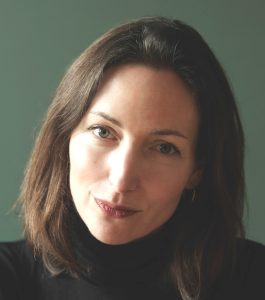 The Louvre. The Tower of London. The Parthenon. St. Peter’s Basilica. An all- inclusive resort in Bermuda. What do all of these places have in common? Well, they are fine to visit, but they are predictable and have been given the designation of ‘tourist traps.’ Often times we are fearful of going off-road and exploring faraway destinations that might not be the headliners for travel agents (if they still exist) and guidebooks. In this scenario, the tourist, or traveler, if you prefer, puts places on his or her bucket list, snaps a photo and moves on, considering much around them, including the locals, as a self-serving means to an end, while the new tourist is humbled by the experience of meeting new people and delving into a culture. The new tourist might even try to learn the language or study the history before visiting the place. In her book, “The New Tourist: Waking Up to the Power and Perils of Travel,” Paige McClanahan may not say exactly where to go, though she does have some enticing stories about the world’s treasure spots, but focuses more on how to go–with an open mind, plenty of curiosity and a desire to be surprised as you step out of your comfort zone. It’s a fun and enlightening conversation.
The Louvre. The Tower of London. The Parthenon. St. Peter’s Basilica. An all- inclusive resort in Bermuda. What do all of these places have in common? Well, they are fine to visit, but they are predictable and have been given the designation of ‘tourist traps.’ Often times we are fearful of going off-road and exploring faraway destinations that might not be the headliners for travel agents (if they still exist) and guidebooks. In this scenario, the tourist, or traveler, if you prefer, puts places on his or her bucket list, snaps a photo and moves on, considering much around them, including the locals, as a self-serving means to an end, while the new tourist is humbled by the experience of meeting new people and delving into a culture. The new tourist might even try to learn the language or study the history before visiting the place. In her book, “The New Tourist: Waking Up to the Power and Perils of Travel,” Paige McClanahan may not say exactly where to go, though she does have some enticing stories about the world’s treasure spots, but focuses more on how to go–with an open mind, plenty of curiosity and a desire to be surprised as you step out of your comfort zone. It’s a fun and enlightening conversation.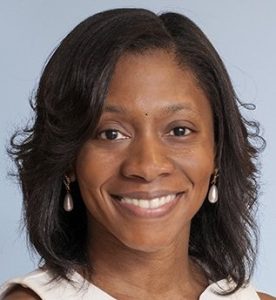 For the first time in a decade, adult obesity in the United States dropped last year, according to a new study and researchers are continuing to determine the role that the dramatic rise in popularity of weight loss drugs, like Ozempic, Wegovy and Zepbound, has to do with that trend. Before 2023, between 2013-2022, obesity numbers were on an uphill trajectory. They plateaued in 2022 before taking a slight dip south. It’s all good news considering the fact that obesity puts individuals at risk for heart disease and is often associated with high blood pressure, high cholesterol and diabetes. Dr. Fatima Cody Stanford, an obesity medicine specialist at Massachusetts General Hospital and Harvard Medical School, has a deep understanding of the causes and effects of obesity and the impact these anti-obesity medications are having on patients. She shares her knowledge regarding the GLP-1, or glucagon-like peptide-1, receptor agonists, first used to treat diabetes, which now are the same drugs approved for people with obesity, as well as others that are now being prescribed to many in our society whose weight issues have a profound impact on their overall health.
For the first time in a decade, adult obesity in the United States dropped last year, according to a new study and researchers are continuing to determine the role that the dramatic rise in popularity of weight loss drugs, like Ozempic, Wegovy and Zepbound, has to do with that trend. Before 2023, between 2013-2022, obesity numbers were on an uphill trajectory. They plateaued in 2022 before taking a slight dip south. It’s all good news considering the fact that obesity puts individuals at risk for heart disease and is often associated with high blood pressure, high cholesterol and diabetes. Dr. Fatima Cody Stanford, an obesity medicine specialist at Massachusetts General Hospital and Harvard Medical School, has a deep understanding of the causes and effects of obesity and the impact these anti-obesity medications are having on patients. She shares her knowledge regarding the GLP-1, or glucagon-like peptide-1, receptor agonists, first used to treat diabetes, which now are the same drugs approved for people with obesity, as well as others that are now being prescribed to many in our society whose weight issues have a profound impact on their overall health.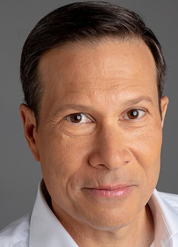 To say that there is a chill in the air at FBI HQ, and its field offices, is an understatement. Perhaps I should call HQ the future “Museum of the Deep State” on day one if Kash Patel is confirmed as its director, as he’s said publicly. Between firings, exposure of agents, analysts and others involved in the Trump and January 6 investigations, and Trump loyalists occupying the 7th floor of the executive suites of the FBI, it is hard to imagine how vigorously wrong doers in America and our foreign enemies are celebrating when they see the confusion, chaos and morale destruction at play. Breaking it all down for us is Frank Figliuzzi a former assistant director for counterintelligence at the FBI, where he served 25 years as a special agent and directed all espionage investigations across the government. He is the author of “The FBI Way: Inside the Bureau’s Code of Excellence.” Imagine this, and it’s not a Hollywood screenwriter’s fantasy, careerists at the FBI have filed two lawsuits against the Department of Justice, the agency that the FBI reports to. If you don’t think our safety and security is on the line, please listen to this podcast.
To say that there is a chill in the air at FBI HQ, and its field offices, is an understatement. Perhaps I should call HQ the future “Museum of the Deep State” on day one if Kash Patel is confirmed as its director, as he’s said publicly. Between firings, exposure of agents, analysts and others involved in the Trump and January 6 investigations, and Trump loyalists occupying the 7th floor of the executive suites of the FBI, it is hard to imagine how vigorously wrong doers in America and our foreign enemies are celebrating when they see the confusion, chaos and morale destruction at play. Breaking it all down for us is Frank Figliuzzi a former assistant director for counterintelligence at the FBI, where he served 25 years as a special agent and directed all espionage investigations across the government. He is the author of “The FBI Way: Inside the Bureau’s Code of Excellence.” Imagine this, and it’s not a Hollywood screenwriter’s fantasy, careerists at the FBI have filed two lawsuits against the Department of Justice, the agency that the FBI reports to. If you don’t think our safety and security is on the line, please listen to this podcast.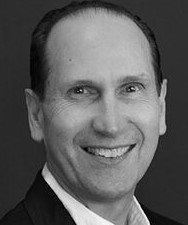 Our memories may be a bit foggy about what brought on the Great Recession of 2008, the worst American economic crisis since the Great Depression. Even George W. Bush, then president, asked his Treasury Secretary, Hank Paulson, to explain to him what went on and how it occurred. In his book, “2008: What Really Happened: Understanding the Great Financial Crisis”, our guest Todd Sheets did a deep dive, with much empirical data to support it, to explain its origins. In his analysis it was not so much the deregulation of financial markets, but rather the role of Fannie Mae and Freddie Mac encouraging middle class and low- income people to get into homes using instruments like variable rate mortgages, along with the easy money policies of the Federal Reserve that brought on a housing bubble like none this nation had ever experienced before. When the bubble burst all types of lenders had bad paper on their books, a crisis ensued, followed by panic. Clearly, these institutions from commercial banks to investment banks and their policies played a role in this, as well, Sheets reminds us. It’s a complicated story that deserves a better autopsy if for no other reason than our desire not to repeat its mistakes.
Our memories may be a bit foggy about what brought on the Great Recession of 2008, the worst American economic crisis since the Great Depression. Even George W. Bush, then president, asked his Treasury Secretary, Hank Paulson, to explain to him what went on and how it occurred. In his book, “2008: What Really Happened: Understanding the Great Financial Crisis”, our guest Todd Sheets did a deep dive, with much empirical data to support it, to explain its origins. In his analysis it was not so much the deregulation of financial markets, but rather the role of Fannie Mae and Freddie Mac encouraging middle class and low- income people to get into homes using instruments like variable rate mortgages, along with the easy money policies of the Federal Reserve that brought on a housing bubble like none this nation had ever experienced before. When the bubble burst all types of lenders had bad paper on their books, a crisis ensued, followed by panic. Clearly, these institutions from commercial banks to investment banks and their policies played a role in this, as well, Sheets reminds us. It’s a complicated story that deserves a better autopsy if for no other reason than our desire not to repeat its mistakes.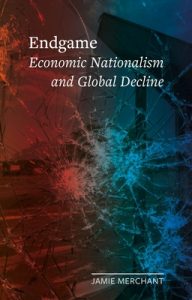 Our guest today suggests that globalization as we know it may be over, closing the books on a significant chapter in modern economic history and an interconnected world order. Industrial policies dismissed as obsolete for decades are being embraced once again by governments worldwide. Could that be the reason that geopolitical tensions are rising? Jamie Merchant traces the roots of this change and economic decline around the globe in the book, “Endgame: Economic Nationalism and Global Decline.” He argues that the greatest political and economic changes of the last decade are due not to globalization but to long-term decay of the market-based economic order. No matter how you look at it the period ahead, with interdependence coming undone, is going to be unsettling or as he says ‘weird’. Even Senator Mitch McConnell recently said that an America First policy, somewhat apart from the economic global order and institutions America built after WWII to keep order, is reminiscent of calls for go it alone policies in the 1930’s. Very unsettling, indeed.
Our guest today suggests that globalization as we know it may be over, closing the books on a significant chapter in modern economic history and an interconnected world order. Industrial policies dismissed as obsolete for decades are being embraced once again by governments worldwide. Could that be the reason that geopolitical tensions are rising? Jamie Merchant traces the roots of this change and economic decline around the globe in the book, “Endgame: Economic Nationalism and Global Decline.” He argues that the greatest political and economic changes of the last decade are due not to globalization but to long-term decay of the market-based economic order. No matter how you look at it the period ahead, with interdependence coming undone, is going to be unsettling or as he says ‘weird’. Even Senator Mitch McConnell recently said that an America First policy, somewhat apart from the economic global order and institutions America built after WWII to keep order, is reminiscent of calls for go it alone policies in the 1930’s. Very unsettling, indeed.